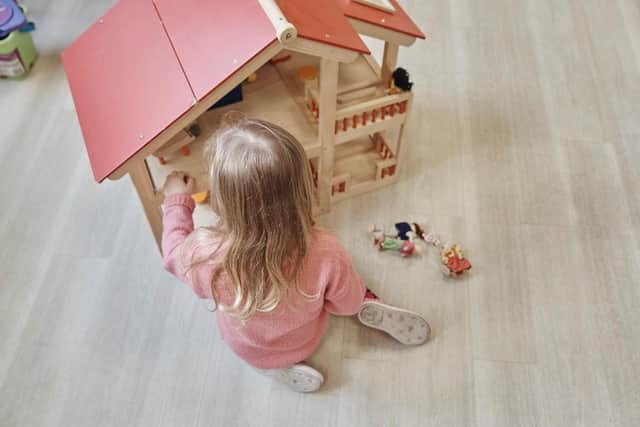Child sexual offences in Warwickshire more than double in five years says NSPCC
and live on Freeview channel 276
Child sexual offences in Warwickshire more than double in five years as NSPCC calls for urgent action to tackle crisis of abuse.
According to the charity, Warwickshire Police recorded 759 child sex offences last year.
Advertisement
Hide AdAdvertisement
Hide AdThe number of offences has increased by 109 per cent over five years compared to the 363 offences recorded by the force in 2014/15.


There was a total of 73,518 recorded offences including rape, online grooming and sexual assault against children in the UK in 2019/20 – up 57 per cent in the five years since 2014/15.
This equates to more than 200 offences, on average, every day last year.
Nationally, where gender and age were recorded, girls were four times as likely to be victims.
Advertisement
Hide AdAdvertisement
Hide AdThere were more than 8,000 offences committed against 14-year-olds, making it the most common age group to report offences.
There were 12,374 sex crimes recorded against children under ten, while 449 offences were recorded against babies yet to reach their first birthday.
A total of 44 out of 45 police forces across the UK provided the NSPCC with the latest data on sexual offences against under 18s after a Freedom of Information request.
Detective Superintendent Pete Hill from Warwickshire Police said: “I fully support the work of the NSPCC raising awareness around the issue of child sexual abuse.
Advertisement
Hide AdAdvertisement
Hide Ad"The reality of the situation is that the lives of too many children are being ruined, this is unacceptable so it is right that this is something we should be all be talking about and taking seriously.
“As a force and with our partners, we have done an awful lot to raise awareness of vulnerability by encouraging staff to see past the obvious when attending any incident but there will always be more we can do.
"We have recently invested significant resources creating a Child Abuse, Trafficking and Exploitation team to enhance the way that we respond to serious child protection incidents because getting our response right to these incidents is essential to us.
“We’re aware there have been concerns nationally that the pandemic has placed some of the most vulnerable children at greater risk as they are less visible to professionals and would have fewer opportunities to talk about anything that is troubling them.
Advertisement
Hide AdAdvertisement
Hide Ad"Whether we are family members, neighbours, teachers, social workers or the police we all have an obligation to be alert to possible signs of abuse and to report it.
“I would encourage members of the public who have concerns about any child to report it, either to the police on 101 (999 in an emergency), the Multi-Agency Safeguarding Hub (MASH) on 01926 414144 or the NSPCC on 0808 800 5000.”
The charity said the figures on child sexual abuse show the need for national leadership in response and urged the Home Office to publish and implement its Tackling Child Sexual Abuse Strategy.
The strategy was announced by then Home Secretary Sajid Javid at the NSPCC’s ‘How Safe are our Children’ conference in June last year.
Advertisement
Hide AdAdvertisement
Hide AdIn May the Home Office said it “will shortly publish the first of its kind cross-government Child Sexual Abuse Strategy to improve the UK’s response to tackling this abhorrent crime”.
The strategy has yet to be published.
The NSPCC is calling for the needs of children and young people to be at the centre of how authorities respond to child sexual abuse, with a focus on effective prevention and victims having access to timely and specialist support.
NSPCC Chief Executive Peter Wanless said: “The crisis of child sexual abuse is not going away and behind these figures are thousands of children and young people who have reported crimes that can have a devastating impact on their lives.
“Urgent action is needed to prevent abuse and to ensure children are supported to recover when they bravely speak out.
Advertisement
Hide AdAdvertisement
Hide Ad“We need concerted leadership from governments across the UK to implement strategies on tackling child sexual abuse that put the experiences and needs of children at their heart and are effective in preventing abuse and helping young people recover.”
The call comes as an NSPCC report found contacts from young people to Childline about sexual abuse in the family tripled during lockdown.
The report published today, ‘The impact of the coronavirus pandemic on child welfare: sexual abuse’, shows there were an average of 23 contacts to Childline per week about child sexual abuse in the home, up threefold since March 23 when lockdown was announced.
Some children told Childline that sexual abuse had become more frequent during lockdown, as they were spending more time with their abuser.
Advertisement
Hide AdAdvertisement
Hide AdA third of counselling sessions were about abuse in the family that happened over a year ago, with many children talking about it for the first time.
The NSPCC wants the anticipated Tackling Child Sexual Abuse Strategy to bring Government departments, including the Home Office, Department for Education and Ministry of Justice, together to join up efforts to prevent sexual abuse across society.
It must also respond to the needs of children and young people who have experienced abuse so they are able to access timely, specialist support that meets their needs and helps them recover. This should include through Child House initiatives where health, policing, social work, therapeutic and other services provide support to children under one roof.
Anyone concerned about a child can contact the NSPCC Helpline for advice on 0808 800 5000. Adult victims of non-recent sexual abuse can also get in touch for support.
Childline is available for young people on 0800 1111 or at www.childline.org.uk